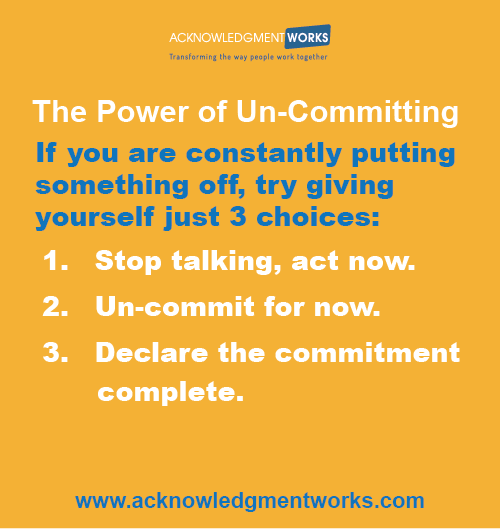Do you ever find you have projects or tasks that you just never get to? Each week you intend finally to start going to the gym, start the diet, clean the garage, organize your office, or launch that new work project you have been talking about for years, only to watch pressing deadlines at work or immediate priorities at home, push these tasks off until next week. I want to share a simple, yet powerful, concept that may make a difference and help you take a few things off your plate.
In 2015, my wife and I were expecting our daughter in December. I blocked off several months after the due date to ensure I would not have to travel in those first few months as a new parent. Seeing all those open weeks on my calendar, my optimistic and clueless new parent-self thought… that will be a perfect time to start writing the book I have been talking about for years (You can laugh now!). The reality of being a new parent kicked in quick, along with the exhaustion, tiredness, and inability to think straight. I would try and sit down to write between meals, naps, diapers, and responding to emails for my company… but it never happened. Each day, a semi-defeated and tired self would say “I will start tomorrow.” After about three months of feeling guilty and making myself wrong for not making progress, I remembered a piece of advice from a mentor of mine.

I was committed to writing my book, but given the circumstances as a new parent, it was not realistic to work on it at the time. I chose to un-commit to writing my book at that moment, and I would revisit the book in January, 2017. I put a reminder in my calendar, closed the book, and felt a weight lifted. I recommitted to my book back in January of this year. I am currently 80% done with my book proposal, which I will finish before the end of this year!
Holding onto a task we are not taking action on may not occupy our physical time, but it often occupies and impacts on our mental time.
Holding onto a task we are not taking action on may not occupy our physical time, but it often occupies and impacts on our mental time. Like the computer with too many windows open, the computer slows down trying to process all the tasks at once. Sometimes it is time to close a few windows.
“Un-committing for now does not mean you’re quitting. It means you are taking a task off the to-do list for now, to revisit at a later date.”
Follow Up Action:
Individually:
This week, commit 20-30 minutes to look at the projects, goals, or tasks (personal and professional) you are constantly putting off, and look at what you could possibly un-commit to for now, or even declare complete.
Write down a list of the personal and professional goals you are consistently putting off. Look at each and ask yourself the following questions:
- Is this something I am still committed to doing? YES/NO
- If NO – Declare it complete and take it off the list.
- If YES – Am I committed to taking action on this now? YES/NO
- If YES – What action will I take today to take action on this?
- If NO – Un-commit for now, and set a date and time when you will revisit this task.
As a Team:
In your next staff meeting, have a discussion about the projects or team goals that you keep putting off. As a team, walk through the above questions to see if there are any tasks or goals you can remove or un-commit to for now, from your team to do list!
Want a weekly reminder with tips and tools to better take care of yourself and your people, check out the A Welcome Interruption weekly mailing.


